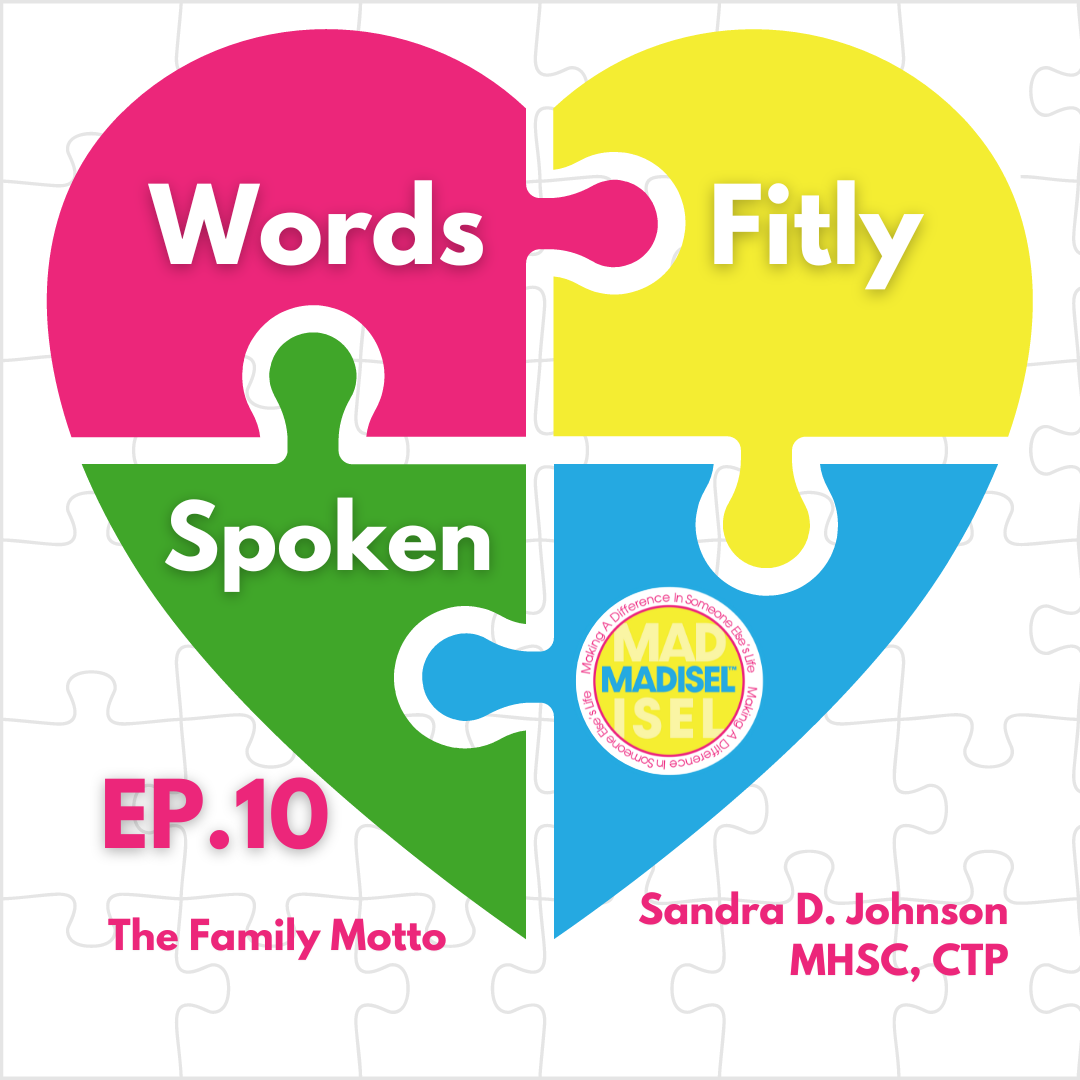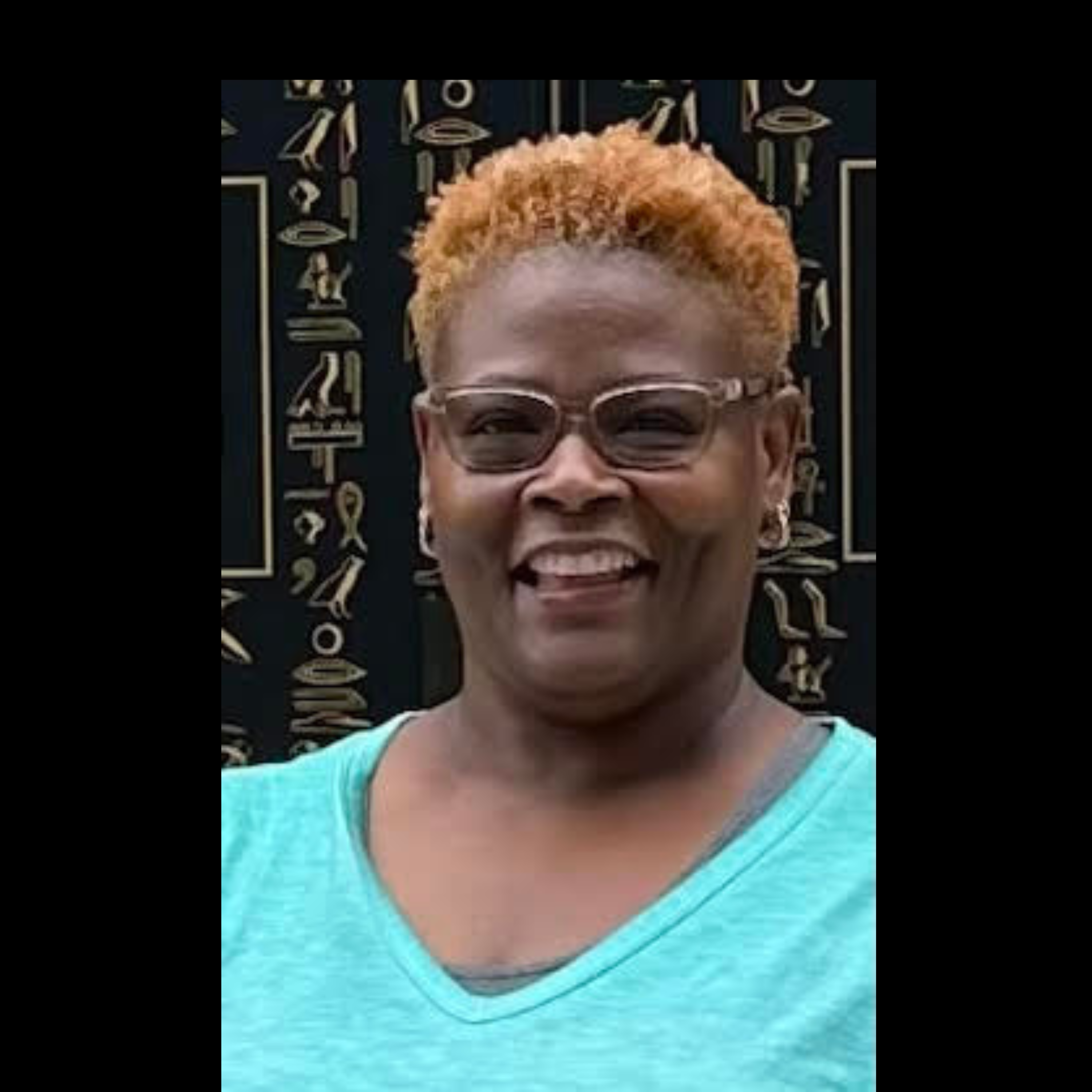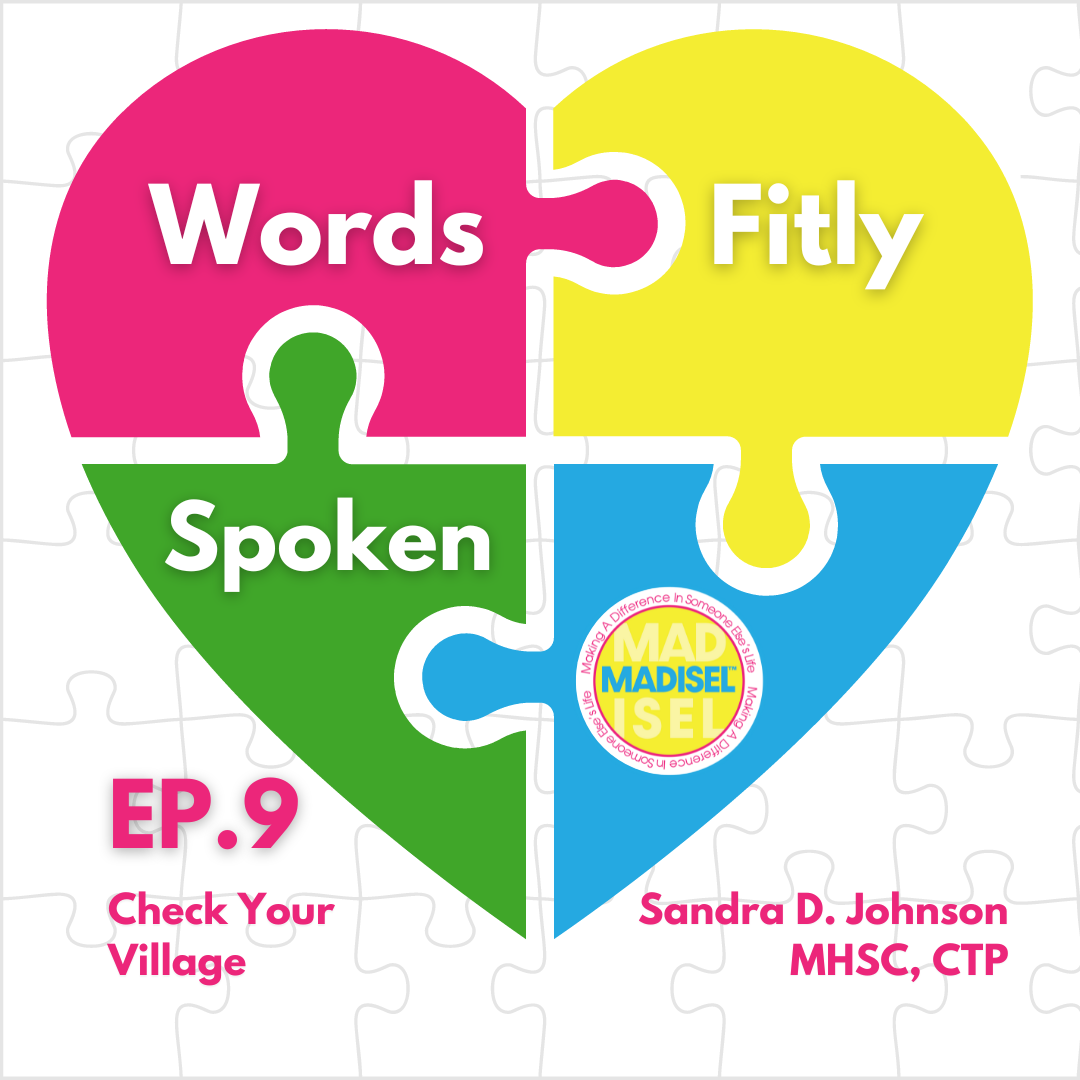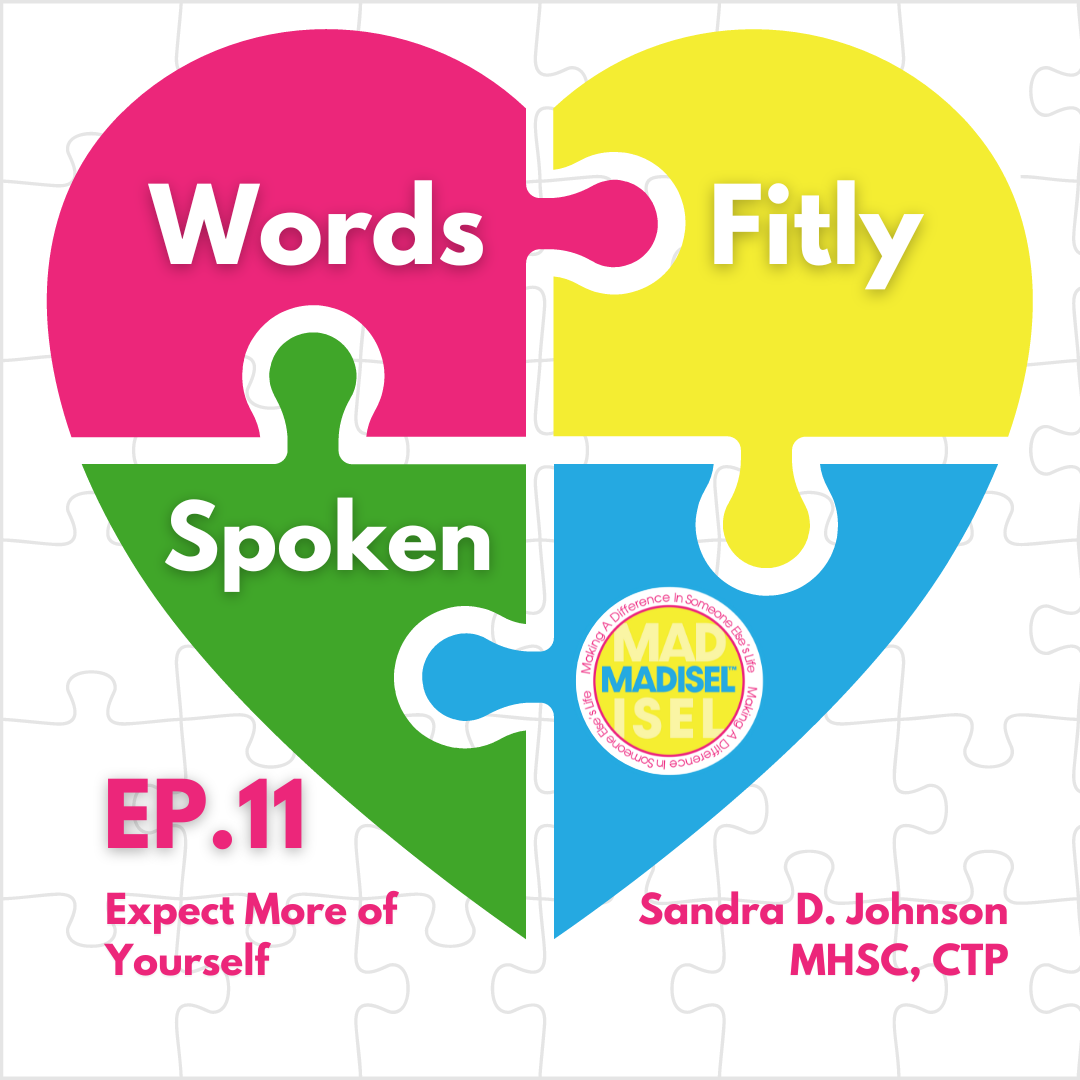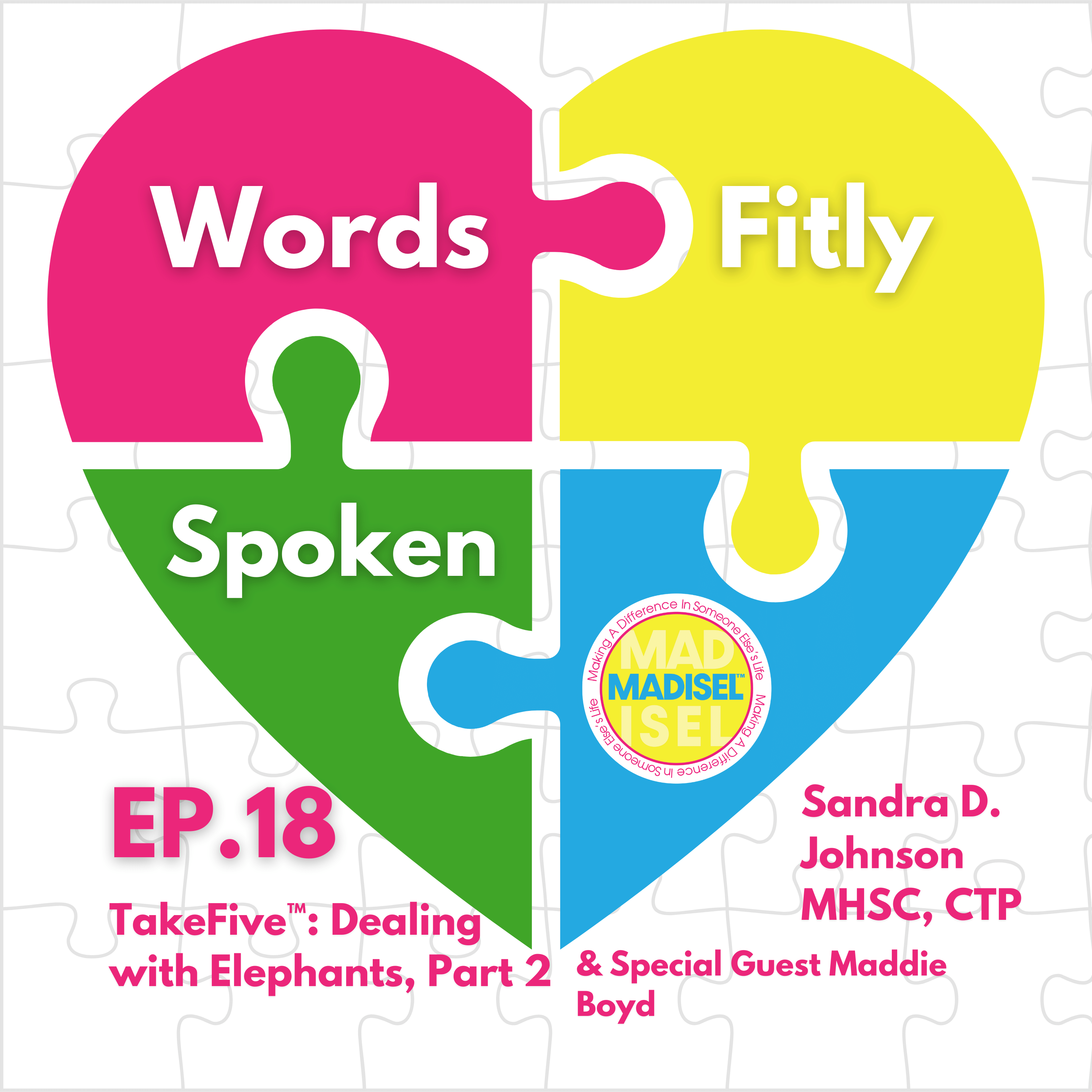What does your family believe and work to achieve? It is important to have words that are posted and discussed in the home and family unit. We encourage you to move beyond just existing in your home and family.
View Full Transcript
Episode Transcript
Welcome to at MADISEL Coach and MADISEL TV's Words Fitly Spoken podcast. Hello there. I'm Coach Sandra, and I'm the host of Words Fitly Spoken podcast. Words Fitly spoken are words spoken at the right time for your encouragement and enrichment. On this podcast, we will deal with emotional and mental wellness by talking about the conflicts we have in our everyday relationships, whether at home, work, school, and the community.
Stop in to hear some helpful words that create awareness about your emotional health. Hey everybody, thanks for coming back to visit with us here at Words Fitly Spoken at MADISEL Coach. I'm family coach Sandra, and I am glad to bring this topic up. I. Last time we've spoke, we talked about the village and family unity inside of that village, what's really going on with the village?
And so today I wanna go into this topic of a family motto. Do you have a family motto? What? What is a family motto? A family motto is what you believe in your family. Like what do you believe? What's happening inside your home? What's happening inside of our home? What do we believe? And sometimes it's unspoken.
So the reason I'm talking about it today is because it is important. That you speak it. It can't just be something that is rolling around in the head of the parents, okay? Because the children, they don't read minds. Uh, we make judgements, but we don't read minds. Parents will make judgements about the kids, but you don't read minds.
So it is important that you. Go ahead and don't just talk about it. I think it's something that needs to be written about and you actually need to post it in your home. This family motto. Okay, so an example of a family motto would be something like this, we fall down, but we choose to get back up. What's that about?
That means. It's okay in my family to fail. It's okay to make a mistake. It's not okay to stay in it. That's what it means. Again, I'll read that motto. We fall down, but we choose to get back up. That's a example of a family motto. Here's another one. Think about this one. We work, we build, we love, we forgive, we fail.
We love again. Again, it's that idea of I'm safe here. I can mess up here and they're gonna keep loving me.
It's important for you all to write down, host it, put it up in a familiar place where everyone gathers. I. The more that our young people are exposed to positive words, it's gonna help how they deal with their emotional and mental wellbeing. I am seeing a lot of young people struggling with even wanting to be in a home.
I just recently begin to say this statement. This is what I'm seeing. I'm seeing young people and children who are housed and they're not home. They're housed and they're not home. And you'll hear me talk about this on this podcast because we have got to, as adults be aware of that as parentals. Be aware of that as supportive family members.
Be aware. That we are seeing a generation in the social services that I do. I'm seeing a generation coming up that are housed. That's great. They have a roof over their head, and sometimes I think society kind of pushes that all you need to be is housed. You're gonna get all your, your deep relationships.
You're gonna find all of those on social media. Now we know that's a lie. Your deep, intimate relationships are real. They are face-to-face. They are not, um, digital. They are face-to-face at some level, and at some point in the relationship, I cannot continue to have a growing, developing relationship. With someone in a digital world that I never touch, I never, um, I never hold their hand.
I never, uh, break bread with them. I need to eat a meal with them. I need to do an activity with them. That is about human interaction, not about being a, a virtual friend. Virtual friends are great as long as they're real. The person on the other side of the virtual device is actually who they say they are, and so it's important to know we cannot just have a generation who is housed and they never know what it is to be home.
They don't know family. They don't know relationships. They don't know connectivity. I. So your family motto can center around that idea. We're here, we're up close, we're personal. It doesn't mean you gotta be in everybody's business. It means we need something that we all can clinging to so that we can stay encouraged because there's stuff to discourage you and your children.
As you know very well every day and every moment of the day. So sit down long enough to develop a family motto, A family motto. All right, so, um, my question now is, do you have one? We all need a focal point. And as I said, a focal point is gonna be a place that you look in the home and we see that statement.
Now, you know, you can do some creative ways, you can paint this, you can, you can have this, uh, professionally done. You can type it and, and post it up, um, in different places in the home. You can also, uh, put it as your. Screensaver on the TVs. It can be screensavers on any of your devices. So definitely consider that when you think about your family motto.
Um, you know that, uh, when we talk about the family, we're obviously gonna talk about the home. And the home must be a safe space for development and growth. It must be more than a place. For just being housed, as I said earlier. And in that what you're doing is you're learning how to change the narrative of what we may have seen in the past.
Changing the narrative. I talk about changing the narrative. It's, you know, it's about using some different words to support. New situations. Right? And so the thing about changing the narrative is this, it is more than just the words that you're gonna speak. It's also about your actions. So if, if the family motto is, if about, you know, forgiveness or starting over, you have to literally forgive.
You have to be willing to start over. Now, that could be with a conversation. We're gonna have a, a conversation about what's new, what starting over looks like. Uh, I messed up. You messed up. Let's pick it up. Let's keep going forward. So again, your, your family motto doesn't have to be a long statement. It can be three words.
It can be a short phrase. It can be whatever you choose for it to be, but you need to have one. I think it's important that, um, it's a, again, a way of everyone having something that they are connected to as a group. Everyone having something that they're gonna choose to believe in as a family. And the great thing about it is that you also get to pass this on to other people that visit your home.
You'll get to talk about it to other people. Your children will model this behavior. Really when, not just when they're in your home, but what you're doing on the inside of the house, it can go out, uh, wherever they go. So it moves to the outside of the house. So that influences how they interact with other people at school, at work, um, in the community.
So please keep that in mind. Um, and when I talk about the narrative, understand changing a narrative and making a motto in your home. Um, the narrative is about your story. What do you want your story to be? So when you change the narrative, you're saying, my story may have been this, but I now need my story to be something else because I want my family to have more stability, more security, uh, stronger emotional and mental wellness.
And remember, emotional and mental wellness are important all year long, not just during the month of May. Okay? I know that's when we, we celebrate or we recognize the awareness, but it's something we need to be aware of all the time. And when a family is involved, children are involved. It's even more important because their emotional and mental wellness is so much more fragile because it's still developing and, and they're exposed to a lot of different things, a lot of different people and a lot of different ideas.
So keep that in mind. As you think about what you want your motto to be, as you think about the narrative of your family, of your home, um, what words do you want included in your story is another way to think of this family motto. Are you all dependable? Are you honest? Are you committed? Are you forgiven?
Do you believe you're healed? Are you hopeful? Are you attentive? Are you, do you have joy? Um, we're seeing a lot of young people talk about not being happy, not having peace, not um, not being honest. A lot of that, well, is honesty something that's important in the home? Is it a part, is it a part of your conversation?
So a lot of times we get shocked by things, but if we will slow down long enough, Those things have been around the whole time. We just haven't stopped to pay attention to them. So keep that in mind. So what I'm saying here with this motto, it actually gives you an opportunity to have a real conversation with the people in your home.
So all of that being said, as I brought up, um, and some other about, you know, who's in your, who's safe, how the home should be, a safe space. We need to remember that trauma is something that is real, and trauma doesn't affect everyone the same way I'm adding this to this particular, uh, podcast because, uh, sometimes we don't have a family motto because we haven't looked and we haven't acknowledged that there have been hurt in our family.
So here's the thing, if there has been hurt, you've gotta stop and talk about it because that trauma, it'll wait for you Trauma. Doesn't just disappear and we can't pretend it didn't happen. So speaking about that, trauma could release, could release you as a family to build something new, to have a new narrative.
So again, remember that trauma is real and one of the best quotes that I have heard about trauma. It's by Dr. Gabor, uh, Matea, and he said that trauma is not what happens to you. Trauma is what happens inside of you as a result of what happened to you. Again, I say it this way, trauma is not what happened to you.
It's what happens in you because of what happened to you. So everyone deals with trauma or, um, acknowledges trauma or, uh, receives the traumatic situation differently. So just because something has happened in your family, it doesn't mean that everyone in the family saw that as being traumatizing. So have a conversation about it as you think about building a new narrative for your family.
Motto, what you are going to believe moving forward. As I talk about trauma, I also must remind you that grief is necessary. It is necessary to grieve and grieving is, is. Um, Grieving things could be something as did you grieve the move we just made? Don't just assume when you move your family and you have these young children and they have to leave their friends, they leave their school that they're just going to get over it.
No one gets over anything. We learn to either get through it or we just hold on. We hold on to it or we learn to get through it. So deal with that as well. Understand that grief is real and it's necessary. Take time to grieve whatever the loss was as an adult, as a parent. If you were on a job and you were, uh, You were let go.
Um, you chose to resign. Whatever it is, you still have to grieve it because it's a loss. If there's a change in your status, um, in a place of employment, in a relationship divorce, you have to grieve a loss. It's not just because of someone passing away. You have to grieve. All types of losses because we have to remember those things were valuable in our life.
So it's acknowledgement and, and again, these things keep you from having a motto that you say out loud. So when these things are just ignored, um, and, and not dealt with, what will happen is those things can become. The family motto without anyone ever saying it, no one should want trauma to be their family motto, or we're just a traumatized people here.
No one should want that. No one should want. We're constantly grieving to be the family motto, but if you don't talk about any of those things and get them resolved, They're going to just fill in an empty space because you left the space empty. We have nothing that we center ourselves in as a family, and I will tell you also, this creates a disjointed young person because they don't know where they fit, and there's a lot of disjoints.
Disjointedness that's going on. So, um, talking about hard things as you think about a family motto is gonna be incredibly important. So, pressing on, I just wanna finish this thought about grief. You know, when we're pressing on in grief it, that does not mean that you're forgetting the hurt and the sadness of missing.
Someone or something that mattered to you. But so learning how to press on or press through something is just a natural thing that we have to do, um, at another time. I do wanna say, I, I don't wanna just quickly hit grief and trauma and, and just disappear with this thought. It's going to come up at other times in the podcast.
I actually am working on having some guests to come in and talk about these, uh, situations from their own personal issues with grief, with grief and trauma. So, um, definitely stay tuned. We're gonna touch these issues again, but I had to bring them up because I can see where, when these issues are ignored.
You really can't, um, you can't really feel successful in building that new family model. You have to deal with some of the old things first. Whatever that old narrative has has been. Before you can build a new narrative for your family moving forward, and you have to acknowledge those things or they will fill in whatever the empty space is for your family model.
So thanks again for stopping by and listening to this topic. Um, it started out. You know, happy and then we had to go to some tough places. But yeah, just hang in there because your emotional and mental wellness are all entangled in how we do relationships, how we even relate to ourselves. So thanks for listening.
Thanks for, you know, stopping in. Remember to like this podcast. Comment on it. You can drop your questions in the comment. You know what? Share it. Make sure you are subscribing to the channel. That's important as well. Thank you again for checking out Words Fitly Spoken at MADISEL Coach. We appreciate you.
Bye-bye.
